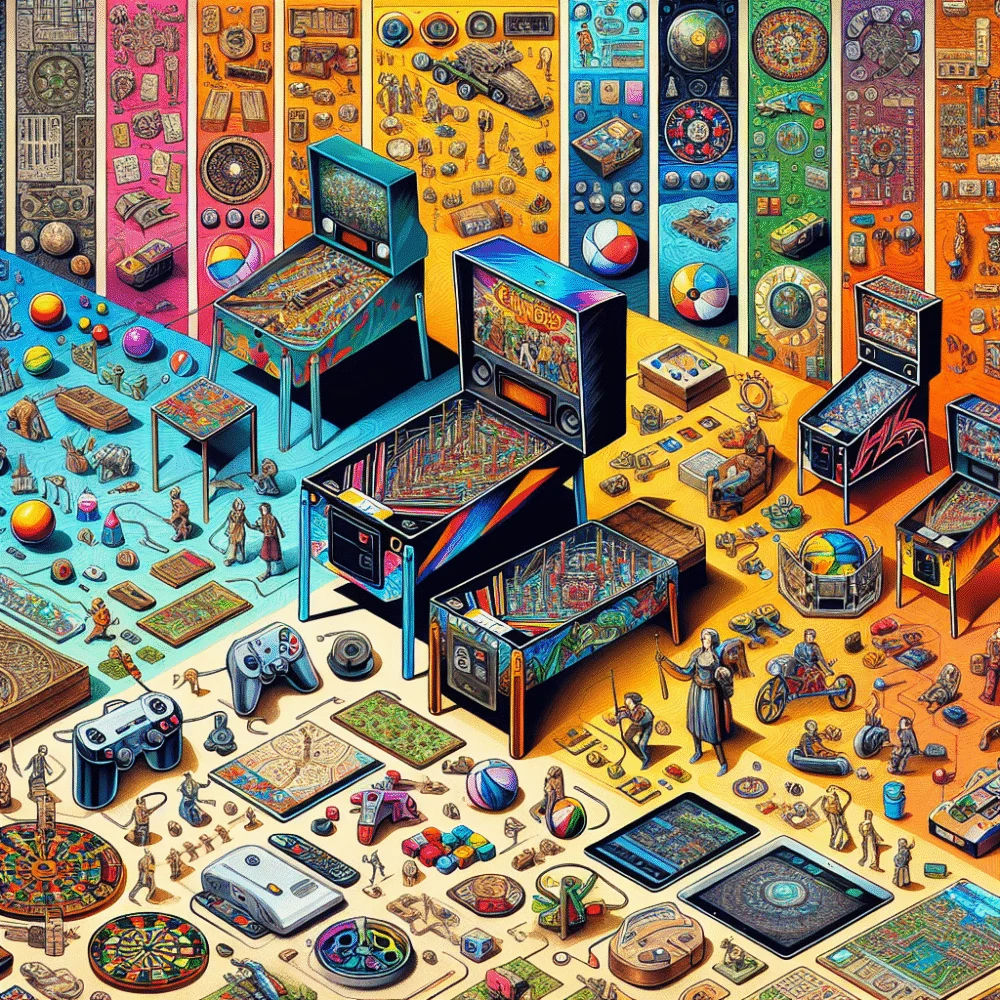The world of games has undergone a remarkable transformation over the decades. From the early days of board games and card games to the digital gaming revolution, the landscape has dramatically shifted, captivating players of all ages. This article delves into the evolution of games, examining how they have influenced culture and society, as well as the exciting trends shaping the future of gaming.In the past, games were primarily played in physical spaces, with family and friends gathering around a table or in a living room. Classic board games like Monopoly and Scrabble were staples, creating bonds among participants. These games promoted social interaction, critical thinking, and strategy. As a natural extension, card games also played a significant role, offering different genres and play styles that catered to varying preferences.However, as technology advanced, digital games began to emerge. The advent of video game consoles and personal computers in the 1970s and 1980s revolutionized the gaming experience. Iconic titles such as Pong and Super Mario Bros. captured the hearts of players, fostering a sense of community as they gathered in arcades or at home to play together. This shift to electronic gaming introduced new dimensions of immersion, competition, and storytelling that traditional games could not achieve.As we progressed into the 2000s, the game industry continued to evolve with the rise of the internet. Online multiplayer games gained popularity, allowing players from different corners of the globe to interact and compete in real-time. Games like World of Warcraft and Fortnite not only provided entertainment but also created vibrant communities, further intertwining gaming with social experiences. The concept of eSports emerged as well, with professional gamers competing in tournaments for massive prizes and recognition, transforming gaming into a legitimate career path for many.Furthermore, mobile devices have democratized gaming access, making it possible for anyone to enjoy a rich gaming experience at their fingertips. Popular mobile games like Candy Crush and PUBG have introduced millions of players to the world of gaming, bridging the gap between casual and hardcore gamers. The convenience of mobile gaming has also led to the development of a unique genre focused on accessibility and short gaming sessions.The impact of gaming extends beyond entertainment. Research has shown that engaging in games can improve cognitive skills, enhance problem-solving abilities, and even promote mental health by providing a sense of accomplishment and escapism. Additionally, gaming has been harnessed for educational purposes, with serious games designed to teach various subjects. This reflects a growing recognition of the potential benefits of games, demonstrating that they are not just a form of entertainment but also valuable tools for learning and personal development.Looking ahead, the future of gaming holds immense promise. Innovations like virtual reality (VR) and augmented reality (AR) are set to redefine the gaming experience, allowing players to immerse themselves in alternate realities that blend seamlessly with the physical world. Moreover, the popularity of AI-powered games is on the rise, presenting personalized gaming experiences that adapt to individual players’ skills and preferences.In conclusion, the evolution of games reflects our changing society and technological advancements. From traditional gathering around a board game to the global phenomenon of online gaming and eSports, the journey has been nothing short of extraordinary. As we continue to embrace new trends and technologies, the future of gaming promises to be exciting, with endless possibilities for creativity and human connection.—————————————–Video games are firmly embedded in modern culture, shaping how we interact, learn, and play. In this second part, we will explore various genres of games and their impact on players and society at large. This diversity not only caters to different tastes and preferences but also contributes to the gaming industry’s growth and potential.One of the most prolific genres is the action-adventure game. Titles such as The Legend of Zelda and Assassin’s Creed immerse players in richly woven narratives, combining thrilling gameplay with storytelling elements. Players often find themselves emotionally invested in the characters and plots, which encourage exploration and creativity. These games have sparked discussions about narrative structures within gaming, pushing the boundaries of how stories are told and experienced.Another genre that has gained significant traction is the role-playing game (RPG). RPGs like Final Fantasy and The Elder Scrolls offer players the opportunity to inhabit different worlds and characters, making choices that lead to various outcomes. This genre fosters deep engagement, as players often invest significant time into character development and plot progression. The emphasis on storytelling and player agency in RPGs has drawn parallels to literature and film, further solidifying gaming as a valid form of artistic expression.Simulation games, such as The Sims and Animal Crossing, provide players with a unique chance to create and manage virtual lives. The relaxing gameplay and open-ended nature of these games have made them popular among various demographics. They offer an escape from reality, allowing individuals to express their creativity in a controlled setting. In recent years, simulation games have also been used as tools for health and therapy, demonstrating their versatility beyond mere entertainment.The rise of battle royale games, including Fortnite and Apex Legends, has revolutionized competitive gaming. These games encourage teamwork, strategy, and quick-thinking, resulting in high-stakes gameplay that has captured the attention of millions. The competitive nature and frequent updates keep the player base engaged, fueling a continuous cycle of excitement and renewal. The popularity of these games has also influenced streaming culture, with platforms like Twitch allowing gamers to showcase their skills and connect with audiences in real-time.Additionally, puzzles and strategy games have garnered a dedicated following. Titles such as Tetris and Sudoku offer challenges that stimulate the mind and provide a sense of accomplishment upon completion. These genres appeal to those who enjoy critical thinking and problem-solving, reinforcing the notion that games can be both entertaining and intellectually stimulating.The gaming industry has recognized the importance of inclusivity and diversity, leading to a wave of games that represent a wider array of cultures, genders, and experiences. This shift allows more people to see themselves in the games they play, which fosters connection and encourages players to engage with narratives in more meaningful ways. As the gaming landscape continues to evolve, it is crucial to embrace this diversity and ensure that every player feels valued.Moreover, the rise of independent game developers has resulted in innovative and unique experiences that push the boundaries of traditional gaming. Indie games like Hollow Knight and Celeste have gained critical acclaim, showcasing that creativity can thrive even outside of major studios. This movement encourages players to support smaller developers, broadening the landscape of gaming and contributing to a rich tapestry of experiences.In summary, the genres of games are as diverse as the people who play them. From action-adventure to puzzle games, each genre provides unique experiences and challenges that attract different types of players. As gaming continues to expand, recognizing and celebrating this diversity will ensure that the industry not only thrives but also evolves in ways that reflect our global society.—————————————–In conclusion, the game industry has continually evolved, adapting to technological advancements and societal changes. From traditional tabletop games to immersive virtual environments, the journey of gaming showcases a fascinating intersection of entertainment, creativity, and community. As we move forward, several key trends and considerations will shape the future of gaming.Firstly, technology will continue to have a profound impact on the gaming experience. The integration of virtual reality and augmented reality is expected to grow, providing players with more immersive and interactive environments. These technologies have the potential to create experiences that blur the lines between reality and the game world, offering players unique opportunities to connect with their surroundings and each other.Inclusivity in gaming will also be paramount. As the demand for diverse characters and narratives increases, game developers will strive to create experiences that resonate with a broader audience. This focus on representation not only benefits players but enriches the gaming landscape with fresh perspectives and stories.The role of gaming in education and mental health will become increasingly recognized. The potential of games as tools for learning and personal development promises to open doors for innovative approaches to education, while there is also a growing acceptance of games as therapeutic tools. By harnessing the engaging aspects of gaming, educators and mental health professionals can foster more effective learning and healing environments.Moreover, the rise of player-driven content and user-generated experiences will shape the future of gaming. Players can take on active roles as creators, designing their own games and levels that others can enjoy. This collaborative spirit can lead to a fertile ground for creativity and innovation, ultimately enhancing the gaming ecosystem.In addition, the impact of streaming and content creation has transformed how games are discovered, played, and enjoyed. For many gamers, watching high-profile streamers and content creators is as entertaining as playing the games themselves. This shift towards a more social, community-based gaming experience highlights the evolving relationship between players and the games they love.As the gaming industry continues to expand and adapt, it is essential to foster a culture of respect, inclusivity, and creativity. By acknowledging the contributions of diverse voices and valuing every player’s experience, we can ensure that games remain a source of joy, education, and connection for generations to come.The journey of games reflects more than just entertainment; it embodies our culture, creativity, and capability to connect with one another. As we face an ever-evolving future, let us embrace the excitement, challenges, and opportunities that games present, shaping a landscape that continues to thrive through innovation and community.










